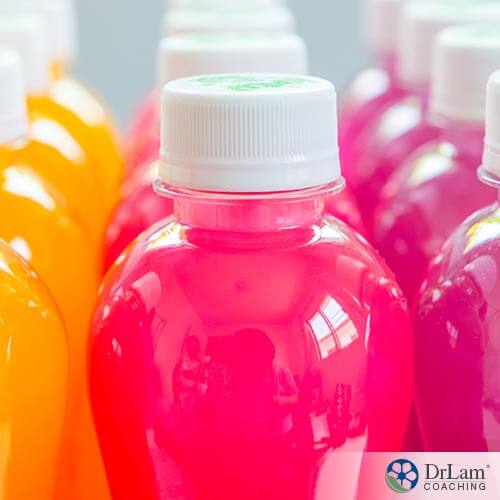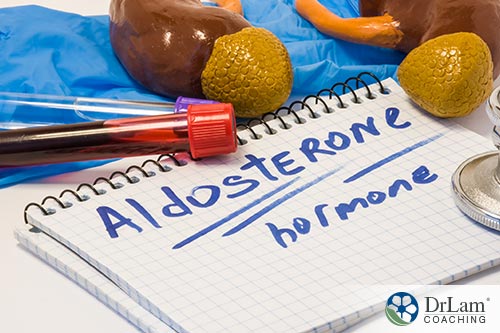Electrolytes are essential minerals that your body needs to function properly. Essential nutrients are those that your body cannot produce itself, so you need to get them from external sources. And not many people are aware of the risks associated with electrolyte imbalance. Some of these risks can be very serious. This is why it's important to understand how different minerals and hormones work together to maintain your electrolyte balance, and what steps you can take to remedy the imbalance when things go wrong.
» Read our complete long-read article on electrolyte imbalance and Adrenal Fatigue Syndrome
» Adrenal Fatigue FAQs
» Take our 3-minute test to see if you may have Adrenal Fatigue
 The most important electrolytes for your body are sodium, potassium, chloride, magnesium, calcium, and phosphate.
The most important electrolytes for your body are sodium, potassium, chloride, magnesium, calcium, and phosphate.
Sodium is crucial for maintaining fluid balance in your body its main role is to help your body retain water. It also helps with nerve signaling and muscle contraction. Potassium, which works closely with sodium, helps to keep your blood pressure levels stable, a function of fluid balance as well. It also helps regulate heart muscle contractions as well as the functioning of other muscles. Chloride is also important for your body’s fluid balance.
The potassium-sodium balance features prominently in many forms of fluid imbalance, including those caused by adrenal fatigue. This is why we usually advise our Adrenal Fatigue Syndrome (AFS) patients to add more, not less, salt to their diets, and to be careful with consuming potassium-rich foods, like bananas. As you will see, electrolyte imbalance can come in many different forms and from many different causes.
Magnesium is important for muscle contraction, nerve signaling, and heart rhythm, and it’s needed to help maintain correct protein-fluid balance, bone strength, and proper digestion. It has also been shown to reduce anxiety and aid with depression. Calcium is another mineral famous for building and maintaining bone and dental health. But it also helps with nerve signaling, cell division, blood clotting, and muscle contraction.
If you’ve ever had a bout of severe diarrhea or vomiting, your doctor may have been given you a packet with a powder containing a mix of different minerals. These were electrolytes, and when you dissolved that packet’s contents into a glass of water, the electrolytes separated into positive and negative ions.
Your nerves use these positively and negatively charged ions to signal to each other. The difference in that electrical charge between the outside of a neuron’s membrane and inside of it is what can create something called an Action Potential. That Action Potential travels through the neuron’s length until it reaches the synapse, where it then causes a reaction to take place that results in neurotransmitters being released there.
Neurotransmitters are the chemicals used by neurons to communicate with other neurons. Some well-known neurotransmitters include dopamine, serotonin, acetylcholine, GABA, glutamate, and norepinephrine.
This is why you can get neuropsychiatric symptoms when you have an electrolyte imbalance, such as anxiety, brain fog, restlessness, confusion, and insomnia.
Other symptoms of electrolyte imbalance include:

Many of these symptoms also show up in AFS, such as the fatigue, weight gain, sleep issues, brain fog, anxiety, unstable blood pressure, dizziness upon standing suddenly, digestive issues, and heart palpitations.
Adrenal fatigue, or AFS, is a condition you can get when you’re facing chronic stress. Even though your body was made to handle acute stress, chronic stress causes imbalances in your body that are difficult to bounce back from quickly.
It also leads to NeuroEndoMetabolic (NEM) Stress Response dysregulation. The NEM is your body’s global response to stress, and it’s composed of six circuits of organs and systems that work together to fight stress. Your adrenals are part of the Hormone Circuit, and they’re your NEM’s first line of defense against stress. They produce your body’s main anti-stress hormone, cortisol, along with 50 other hormones, some of which are important for fluid balance.
With chronic stress, the adrenals overwork to produce cortisol. In the beginning, the adrenals will produce higher amounts of cortisol than is normal or healthy. This brings on a set of AFS symptoms. After a while, however, the adrenals will become exhausted and their hormone production will drop. That will make the symptoms more severe and manifest new symptoms as well.
The drop in hormone production that comes with AFS can lead to imbalances in hormones your body needs to regulate fluids, leading to electrolyte imbalance. There are several other causes of this condition as well.
Electrolyte imbalances may be the result of one or a combination of the following:

A diet that doesn’t provide you with enough of these electrolytes naturally is another very common culprit. Remember, these are essential nutrients, meaning your body cannot produce them on its own. So you need to get them through food or supplementation.
But, as we’ll see later, if you have issues with hormones like aldosterone and cortisol, even what you think is a very healthy diet could be aggravating your sodium-potassium balance.
The ketogenic diet, while in certain cases healthy, can lead to too much fluid loss. It can involve cutting out foods that are high in key electrolytes, leading to imbalances especially in sodium, magnesium, and potassium.
You can also have a problem absorbing electrolytes, even from a balanced diet. This malabsorption can be caused by issues with digestion or the integrity of your GI tract lining and microbiome. Dysbiosis and leaky gut syndrome are more common than most realize. And they aren’t usually the first place people look when experiencing symptoms of electrolyte imbalance.
 Another major cause of electrolyte imbalance is issues with the hormone and endocrine system. Hormones, like electrolytes, help regulate your body fluids. Water in the body is contained inside the cells as well as in the extracellular space, or interstitium, in certain ratios. These ratios are maintained when each space has the right fluid-to-electrolyte concentrations.
Another major cause of electrolyte imbalance is issues with the hormone and endocrine system. Hormones, like electrolytes, help regulate your body fluids. Water in the body is contained inside the cells as well as in the extracellular space, or interstitium, in certain ratios. These ratios are maintained when each space has the right fluid-to-electrolyte concentrations.
Your body needs to take in water from food and drink as well as to excrete water containing waste material in order to function properly. The amount of water excreted by your kidneys is regulated by aldosterone and antidiuretic hormone (ADH). Problems with ADH are rare, though they can still happen and can lead to a condition called diabetes insipidus. But problems with aldosterone are fairly common, especially with AFS.
Aldosterone is secreted by the adrenal glands, and one of its main functions is to tell the kidneys to retain sodium rather than allow it to be flushed out in urine. Sodium allows the body to hold onto water. And the more water your body has, the more blood volume it has as well. Higher blood volume increases blood pressure, which is why hypertension patients are told to consume less salt.
In healthy people, the adrenals release aldosterone in a continuous way with varying levels depending on the need. To regulate blood pressure, for example, the adrenal glands will either release more aldosterone or less. If blood pressure is low, more aldosterone is released, if blood pressure is high, less is released.
But if you have an electrolyte imbalance, especially due to sodium levels, this natural and automatic process gets disrupted. Your adrenals can release aldosterone, which signals to the kidneys to retain sodium, but there isn’t enough. That means less water retention, despite the body’s efforts, which could then result in low blood pressure.
Low sodium levels are not just a result of low sodium intake. They can also happen when you ingest too much of a sodium-opposing mineral, such as magnesium or potassium. And, in adrenal fatigue, this electrolyte imbalance is quite common.
What happens with AFS is that, as the adrenals get weaker, their aldosterone output is compromised, just like with cortisol output. And when your aldosterone levels drop, you retain less sodium, and you then lose more water. On top of that, you are still drinking your coffee, which is a natural diuretic. And foods that are by most measures healthy - such as green vegetables, cruciferous vegetables, and fruits - often contain a lot of potassium, which opposes the little sodium your body has left. And they are also natural diuretics because of their high water content.
This can lead to a state of chronic dehydration. It is why many people with AFS experience thirst and frequent urination as symptoms, as well as unstable blood pressure levels.
If this subclinical dehydration continues, your body will start to go into “fight or flight” mode, with high epinephrine (adrenaline) and norepinephrine release in order to help raise your blood pressure levels. A bigger problem happens, though, if this “fight or flight” response is continuously triggered - it can lead to the NEM's Cardionomic Circuit and Neuroaffect Circuit dysregulating. Symptoms of such dysregulations include anxiety, panic, nightmares, a sense of doom, heart palpitations, pounding heart, faster heart rate, tachycardia, cardiac arrhythmia, pain and tightening in the chest, and shortness of breath.
These issues then add even more pressure on your adrenals, worsening your AFS and NEM dysregulation. All the while, the dehydration and sodium-potassium imbalance remains. The dehydration can also lead to, or worsen, kidney problems, which themselves can be a cause of electrolyte imbalance.
Your Detoxification Circuit needs optimally functioning kidneys in order to help your body get rid of toxins and metabolic byproducts that your immune system and liver have neutralized. If these kinds of substances remain in your system too long, you begin to get a toxic buildup. That will then create higher levels of inflammation in your body, meaning your Inflammation Circuit is now at risk of dysregulating. When inflammation becomes chronic and spreads to different areas of your body, you can get serious problems there.
As you can see, many of these conditions affect each other, and the NEM is at the center of it all, trying desperately to bring the body back to a state of homeostasis.
A simple blood test can check your electrolyte levels. Usually, it’s done as part of a basic or comprehensive metabolic panel. Then, you might be told whether you are deficient in one or more of the essential minerals needed for optimal functioning. Most of the time, these tests are also done as part of a check-up routine if you have a chronic condition that affects your electrolytes. In such cases, you require monitoring to ensure no deficiencies occur. This also goes for if you’re taking a diuretic medication.
But what if you don’t have, or don’t know you have, such a condition? What if the condition you actually have is one that is not yet recognized by mainstream medicine, such as AFS and NEM dysregulation?
In these instances, your healthcare professional may not think of testing your electrolytes. And, even if you go to them with symptoms, they may believe them to be part of some other issue. Many times, adrenal fatigue is confused with depression, chronic fatigue syndrome, and even PTSD. Then, you can end up getting treated for the wrong issue, and the underlying cause is left to advance and get worse.
This is why it’s important that, if you suspect you have an electrolyte imbalance, you not only check your mineral levels, but you also work with your healthcare professional to get to the root of the problem. It’s also important that you don’t just look at the level of each electrolyte separately. A relative imbalance in a pair, such as sodium and potassium or magnesium and calcium, is more common and causes problems just the same.
 If you are experiencing dehydration, you may believe that the best thing you can do is increase your water intake. And, in many cases, that does help. Most people are subclinically dehydrated. They drink a lot of caffeinated drinks, juices, and sodas, and not enough pure water. Most people are not getting their 8 glasses of 8 ounces of water a day.
If you are experiencing dehydration, you may believe that the best thing you can do is increase your water intake. And, in many cases, that does help. Most people are subclinically dehydrated. They drink a lot of caffeinated drinks, juices, and sodas, and not enough pure water. Most people are not getting their 8 glasses of 8 ounces of water a day.
And, if you have AFS, you should actually drink 12 glasses of pure water a day. But because many AFS sufferers aren’t even aware that this is what they have, they go on as usual, getting more dehydrated each day. They then feel the symptoms of dehydration and, such as fatigue, brain fog, and lightheadedness, and decide they need more caffeine to get through the day. This then worsens their situation further.
If you have AFS, you might find it quite difficult to regain a good fluid-electrolyte balance, especially if you're at the beginning of your recovery journey. You’ll read that you should add salt to your water, but at the same time, you might be hypersensitive to minerals. They are too stimulating for your adrenals, and cause paradoxical reactions or even adrenal crashes. At the same time, if you increase your water intake too quickly, you’ll exacerbate your electrolyte imbalance, and that can also lead to an adrenal crash.
Whether you have AFS or not, you still need to be careful with how you increase your water intake if you have any kind of electrolyte imbalance. You don’t want to flush out more minerals than necessary and create more deficiencies. That’s why sports drinks contain electrolytes.
But what is certain is that, even if you take mineral supplements and increase your water intake gradually, if you don’t solve the underlying issue, these problems will come back. When the underlying cause is a medication, you may need to switch. If it’s a chronic condition, such as diabetes, you need to find a way to manage it properly. When it’s diet, then you’ll want to work with a nutritionist to create a good plan.
If the imbalance is quite severe, your healthcare professional may opt to give you electrolytes intravenously for a while. They may also need to monitor your cardiac activity with EEG. You should also test your electrolyte levels regularly for a period of time after therapy to make sure you’re on the right track.
In all cases, you should follow up with an AFS specialist, because it’s more than likely that whatever caused the imbalance in the first place may have also resulted in adrenal fatigue. And if your adrenals continue to weaken, you can end up with low aldosterone levels, which will create recurring issues with your electrolytes, fluid balance, and blood pressure levels.
» Read our complete long-read article on electrolyte imbalance and Adrenal Fatigue Syndrome
» Adrenal Fatigue FAQs
» Take our 3-minute test to see if you may have Adrenal Fatigue
Electrolyte imbalance can happen due to a number of reasons. And it can also create issues with your health that then worsen that imbalance. It can turn into a cycle of aggravation that can be difficult to disrupt. And, to make matters more challenging, this cycle can lead to adrenal fatigue and NEM dysregulation.
But, unless this imbalance is mild and was caused by a temporary problem, like a stomach flu, you’ll need to be careful with how you deal with it. Simply loading up on water and mineral supplements could easily worsen the imbalance rather than helping it.
That’s why we highly recommend you get expert guidance to help you through the recovery process smoothly and with as few risks as possible.
This is a good question because it aims at addressing the underlying issues rather than the symptoms of electrolyte imbalance. So, instead of just taking extra supplements, you’ll want to uncover the root causes first. Some of which can be quite serious and require immediate medical attention.